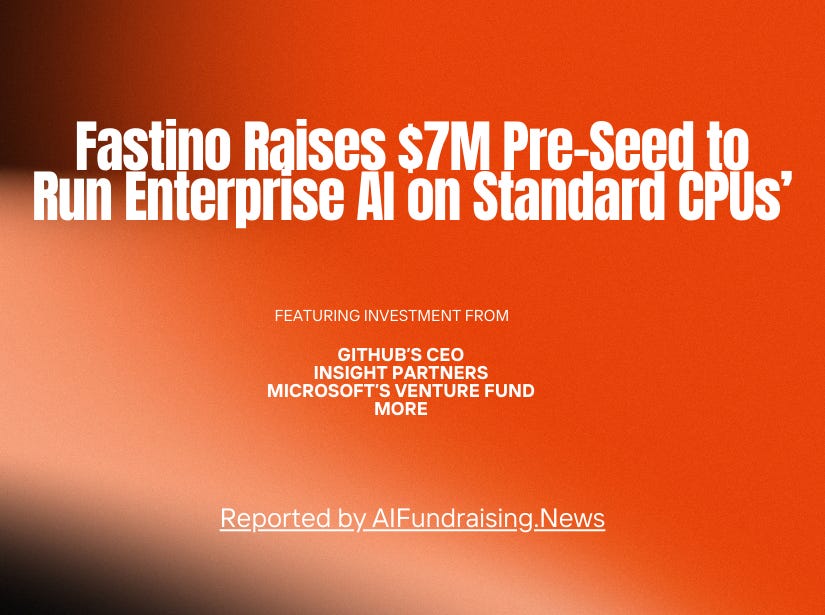Deal Brief: Fastino Raises $7M to Build Task-Specific AI Models That Skip GPUs
Meet the startup tackling enterprise AI's twin challenges: expensive GPUs and imprecise models
There’s a stark reality haunting the halls of enterprise IT departments right now: implementing AI isn’t just a technical challenge, it’s a double-headed monster of supply chain and accuracy problems. Want to deploy a language model? First, get in line behind Meta, Google, and Microsoft for those precious GPUs. Oh, and while you’re waiting (about 12-18 months at current estimates), maybe take out a second mortgage to afford them. Then comes the fun part: hoping your general-purpose AI model is actually accurate enough for your specific business needs.
Enter Fastino, emerging from stealth today with a compelling proposition: what if you didn’t need those GPUs at all, and what if your models were actually optimized for your specific tasks? The startup, announcing a $7M pre-seed round, claims it can run sophisticated AI models on the CPU hardware you already have – and make them both faster and more accurate than their GPU-dependent cousins through task-specific optimization. It’s a bit like someone telling you they’ve figured out how to make a Prius outrace a Formula 1 car while using less fuel and staying on track better. Intriguing, if true.
The Deal Sheet 📋
Round: $7M Pre-seed (notable size for this stage)
Lead Investors: Insight Partners and M12 (Microsoft’s Venture Fund)
Notable Participants: NEA, CRV, Valor, GitHub CEO Thomas Dohmke, and others.
Key Metrics:
Claims 1000x faster inference than traditional LLMs on CPU hardware
Enhanced accuracy through task-specific optimization
Target Market: Enterprise AI deployment, particularly in regulated industries
Location: Palo Alto, California
Behind the Numbers
The timing isn’t accidental. A recent McKinsey study shows 63% of enterprises implementing AI are struggling to see ROI, largely due to two factors: infrastructure costs and model inaccuracy. Meanwhile, Nvidia’s H100 GPUs – the gold standard for AI training – are backordered into 2025, with prices soaring past $40,000 per unit on secondary markets. Some companies are paying more for AI hardware than they do for their entire remaining IT infrastructure, only to end up with models that aren’t precise enough for their specific needs.
The Pitch
Fastino’s approach represents a departure from conventional wisdom: rather than building general-purpose AI models (your ChatGPTs and Claudes), they’re creating what they call “task-optimized” models. Think less “AI that can write Shakespeare and code” and more “AI that does one specific business task really well, really accurately.”
The startup’s CEO, Ash Lewis (previously of DevGPT), puts it bluntly: “We were spending close to a million dollars a year on API calls alone. We didn’t feel like we had any real control over that.” His solution? Build models that not only run on hardware companies already have but are precisely tuned for specific business functions.
Market Overview & Opportunity
The enterprise AI infrastructure landscape is hitting an interesting inflection point:
McKinsey reports 63% of enterprises struggle with AI ROI due to infrastructure costs and accuracy issues
GPU supply chains are severely constrained: H100s are backordered into 2025
Enterprise IT teams face a trilemma: high cloud API costs, expensive GPU infrastructure, or compromised accuracy
Regulated industries (healthcare, finance) need both precision and data sovereignty
The market is bifurcating between general-purpose AI and specialized enterprise solutions
Why This Could Actually Matter
Three reasons this isn’t just another AI startup story:
The GPU Problem is Real: Enterprise AI deployment is bottlenecked by hardware availability and costs. When your infrastructure costs more than your entire AI team, something’s wrong.
The Accuracy Imperative: General-purpose models often lack the precision needed for specific business tasks. Fastino’s task-optimized approach could change this equation.
Regulatory Reality: Many enterprises, especially in finance and healthcare, need both on-premise deployment and high accuracy. They can’t just throw cloud APIs at the problem.
Open Questions
Technical Validation:
Can they really deliver 1000x inference speedups on CPU hardware?
How does task-specific accuracy compare to fine-tuned general models?
What are the performance trade-offs?
Enterprise Adoption:
Will their initial traction with a major North American device manufacturer translate to broader uptake?
Which specific tasks show the most promise?
Competition Response:
How will cloud providers and existing AI infrastructure companies respond?
Will we see similar CPU-optimized, task-specific offerings?
Scaling Economics:
As deployment scales, how will the total cost of ownership compare?
Can they maintain accuracy advantages at scale?
Key Takeaways
Dual Innovation: Fastino isn’t just tackling the GPU bottleneck; they’re rethinking model accuracy through task specialization
Market Timing: With enterprises struggling with both ROI and accuracy, the timing for a task-optimized approach seems right
Infrastructure Revolution: Their approach could fundamentally change how enterprises think about AI deployment
Early Validation: Having a major device manufacturer as an early partner suggests their dual value proposition resonates
What to Watch For
The next 6-12 months will be crucial. Watch for:
Independent benchmarks of both speed and accuracy claims
Task-specific performance metrics across different use cases
Enterprise adoption announcements, particularly in regulated industries
Their burn rate – $7M doesn’t last long in AI development
The Bottom Line
If Fastino delivers on its promises, it could help democratize AI deployment while simultaneously making it more precise and useful for specific enterprise needs. That’s a compelling combination – if they can pull it off.




